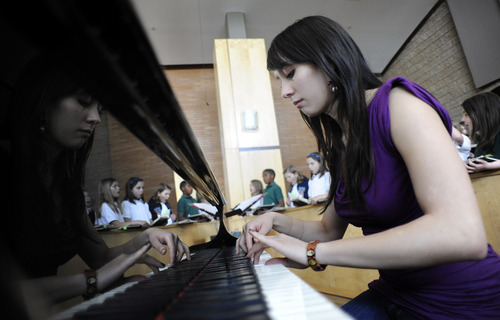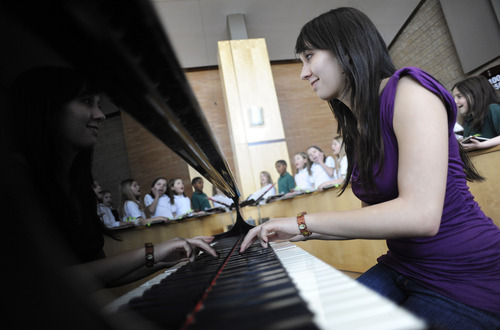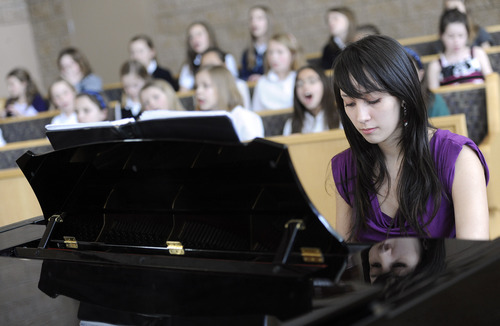This is an archived article that was published on sltrib.com in 2011, and information in the article may be outdated. It is provided only for personal research purposes and may not be reprinted.
Vanessa Wall, a Bingham High senior, packs a lot into a day. When she is not in school, she is practicing piano, caring for her grandfather or playing zither in a traditional Vietnamese musical ensemble. She stays up until midnight or later to finish her homework and prep for tests. And she gets straight A's.
But even high-achieving Wall often feels droopy-eyed in class when the bell rings at 7:30 a.m.
"In the mornings, I feel like a zombie," she says. "I try to pinch myself to stay awake."
Daylight Saving Time, which kicked off Sunday, isn't going to help.
Most teenagers already are not getting the nightly sleep they need, surveys show. And while many may be staying up late to cram for exams, the problem may not be so much bedtime as school start time.
"As children develop into their teenage years, their bodies are biologically predisposed towards later bedtimes," says Amy Wolfson an expert on adolescent sleep and an associate dean at College of the Holy Cross in Worcester, Mass. "If kids are having to get up as early as 6:30, they're not going to be able to get an adequate amount of sleep."
Adolescents need between 8.5 and 9.5 hours of sleep each night and naturally fall asleep later at night, according to sleep research.
But, on average, 13- to 18-year-olds are getting 7.5 hours of sleep on weeknights, according to a survey released this week by the National Sleep Foundation. More than half of teens said they wake up between 5 a.m. and 6:30 a.m.
Why not give teens more sleep time by starting school later?
Shifting high school start times has often proved difficult. Teen shuteye competes with other pressing demands such as bus schedules, after-school activities, sports competitions and the preferences of teachers, parents and administrators.
"It is kind of hard to convince school districts to start later because of other variables. But if their ultimate goal is for kids to learn, you just don't learn well when you are falling asleep in class," says Paul Teman, a physician and sleep specialist at University Hospital's Sleep-Wake Center. "When schools are starting earlier, my feeling is you are going against hard-wiring."
—
Responding to research • In the early 1990s, scientific evidence of teens' biological sleep patterns sparked conversations nationally about high school start times, which typically precede middle and elementary schools.
In Minnesota, the Minneapolis School District moved its high school start time from 7:15 to 8:40 a.m. in 1997-98 to give students another hour-plus of sleep. The University of Minnesota's Center for Applied Research and Educational Improvement found that attendance improved, grades climbed slightly and students reported fewer depressive feelings and continued to get an extra hour of sleep each night. (Some worried that teenagers would simply stay up an extra hour if given a later start time.)
In Utah, the Salt Lake City School District spent a year studying possible ways to delay high school start times, but scrapped the idea in 2000 after an estimate pegged the transportation cost at $2.1 million the first year and $727,000 every year after. Still, a task force found that there would be no additional busing cost to delay by 30 minutes the start times of all elementary, middle and high schools.
Along the Wasatch Front, some high schools are making adjustments to their schedules to allow for morning collaboration time for teachers. As an added benefit, students get to sleep in.
Herriman High is looking into moving its 7:25 a.m. start back to 7:55 a.m. next fall, following the lead of fellow Jordan district high schools Copper Hills and West Jordan. Canyons district high schools also start at 7:55 a.m.
Even with a later start, Herriman High's end time, 2:25 p.m., would stay the same by shaving minutes off lunch and breaks between classes. Herriman is launching a survey of students, parents and teachers to gauge their support. Jordan's Board of Education would have to sign off.
"Every kid that walks in at 7 o'clock growls. But that's been happening since I was in school," says James Birch, principal of Herriman High. "There are kids, at this point in time, who are under a little bit different types of demands. There are so many more things to keep them busy."
Delaying the school day, Birch says, will provide an hour before school when students can visit teachers to get one-on-one help or make-up exams. It's difficult to find that time after school, he notes, because kids often have to get to jobs, club meetings or sporting events. Teachers also will use the 7 a.m. hour to prepare for class.
"It's student-driven. We're trying to find a way to give kids that one-on-one face time with their teachers that they need," Birch says, noting students log 3,000 to 5,000 before-school visits at West Jordan High each quarter.
To avoid messing with bus schedules, a Herriman High shift would leave morning bus routes intact. Students who ride the bus would arrive at school early.
—
Start late or leave early? • In Provo School District, parents pushed for a late-start Monday instead of an early-out Friday for middle and high schools when the district moved to standardized schedules. Teachers at the district's high schools now can meet Monday mornings for collaboration time. School starts at 8 a.m. instead of 7:30 a.m.
"It's the greatest thing ever," says Provo parent Cindy Hoopes, who has two sons in middle and high school. "Coming off the weekend, when they usually haven't gotten enough sleep … it makes Monday morning not like 'Oh Monday.' "
Her son Nathan, a Provo High junior, agrees that late-start Mondays are a welcome reprieve, but he struggles to wake up the rest of the week. Nathan Hoopes is a competitive ballroom dancer and often does not get home from practices and competitions until 10 p.m.
In the mornings, he often puts off his mother's wake-up calls until 7:15 a.m., dashing out the door to be at school at 7:30 a.m.
"I can't even open my eyes. It's like they're swollen shut," Hoopes says. "Sometimes I even get dressed the night before because I know I'm not going to have time."
Wall, the Bingham High senior, says her ideal start time would be 8:30 a.m. She would still like to get out of school between 3 and 3:30 p.m. and have enough time for after-school activities.
She can't remember the last time she got nine hours of sleep.
She usually gets five to seven hours. Two mornings a week, she has to be at school at 6 a.m. to practice violin in the Bingham High Symphony. As the concert mistress, she sits in the first chair.
"I wake up at 5:15 a.m. It's painful sometimes, but I have to do what I have to do," says Wall, who hopes to attend an Ivy League school next year. "If you want to accomplish something, you just have to do it. I think it's about time. If you know how to manage your time you can do it, even though it's a lot of things."
But she still would like a little more time in the mornings for sleep.
Tips for healthy sleep
Set and stick to a sleep schedule with consistent go-to-bed and wake-up times.
Expose yourself to bright light in the morning and avoid it at night.
Exercise regularly but avoid vigorous exercise close to bedtime.
Establish a relaxing bedtime routine that helps you wind down.
Create a comfortable sleeping environment that is free of distractions.
Keep a "worry book" next to your bed. If you wake up because of worries, write them down with an action plan and forget about them until morning.
Avoid caffeine, chocolate, tobacco, alcohol, big meals and tall beverages before bedtime.
No late-afternoon or evening naps, unless you work nights. If you must nap, keep it under 45 minutes and before 3 p.m.
Source • National Sleep Foundation







